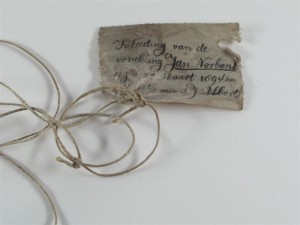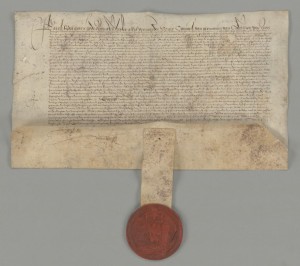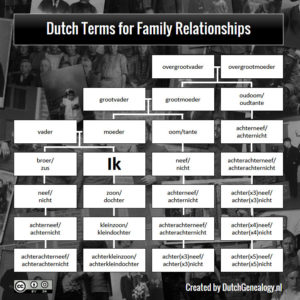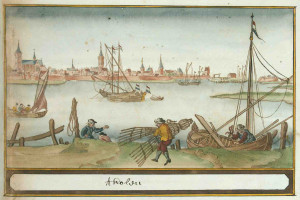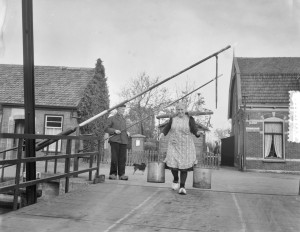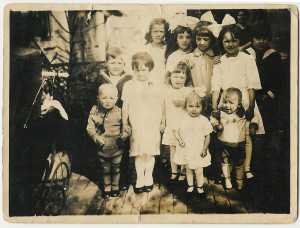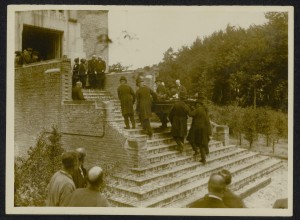As you probably know, Dutch children were usually named after family members. If one of your brick wall ancestors had an unusual name, or gave one of their children an unusual name, it might be worthwhile to look who else in the community shared that name. You can then investigate that person's family to see if your brick wall ancestors fits in somehow. The other person could well be a grandparent, aunt, uncle, godparent, but could also be the landlord. They may have left records of their own … [Read more...]
Dutch term – Regest
A regest is an abstract of a record, usually of a medieval charter. Many archives provide regesten of their oldest records, which are often in Latin and in a handwriting that is hard to read to modern eyes. You can find regesten at the websites of archives, or in published oorkondenboeken (charter books). See the article about Oorkonde (charter) for links to these online charter books. … [Read more...]
Dutch term – Family Relationships
This diagram shows you the Dutch terms for the most common family relationships. In practice, we don't use the more distant relationships than achterneef/achternicht; we just call them "verre neef" or "verre nicht" [distant cousin]. … [Read more...]
Dutch term – Visser
A visser is a fisherman. Fishing was a common occupation in the coastal towns of the Netherlands, including those surrounding the Zuiderzee (now: IJsselmeer). Willem Beukels, a fisherman from Biervliet in Zeeland, invented the technique of gibbing herring, which allowed Dutch fishermen to remain at sea for longer periods of time before the fish would go bad. The secret of gibbing gave the Dutch a commercial advantage. Du tch herring is still renowned. … [Read more...]
Dutch term – Tol
A tol was a toll, which was collected by a tolgaarder or tollenaar (toll collector). In earlier times, there were many tolls, often collected at strategically important locations along roads and rivers. Sometimes, a toll only had to be paid for transporting goods, but often even pedestrians had to pay a fee in order to pass. Treaties may have exempted some people from having to pay a toll. For some of these tolls, toll records have survived. They can provide useful insights into the lives … [Read more...]
Dutch term – Oorlog
The term oorlog means war. When Dutch people speak about "the war," they usually refer to World War II. From 10 May 1940 until 5 May 1945, the Netherlands was occupied by Germany. Some parts of the country were liberated earlier, but it would take until 5 May 1945 for the Germans to surrender. That will be 71 years ago this week. On May 4th, we commemorate the fallen, not just during World War II, but everybody who died as a result of war or peace-keeping missions since the outbreak of … [Read more...]
Dutch term – Koning and Koningin
A koning is a king and a koningin is a queen. The Netherlands has been a monarchy since 1806, when Napoleon crowned his brother Lodewijk Napoleon as King of what was then called the Kingdom of Holland. In 1815, after the French had been defeated, King Willem I of the House of Orange was inaugurated as the first King of the Netherlands. The Netherlands has had the following reigning monarchs: King Willem I (1815-1840) King Willem II (1840-1849) King Willem III … [Read more...]
Dutch term – Achternicht
An achternicht (literally: behind cousin) is a female relative. The term covers the English terms great-niece, first cousin once removed and second cousin. The male form is achterneef. … [Read more...]
Dutch term – Crematie
Crematie is the Dutch word for cremation. In 1874, a group of Dutch people organized a foundation for the introduction of corpse burning in the Netherlands. They lobbied to allow cremation, which was forbidden by law. Their efforts led to the building of the first crematorium in 1913 and the first cremation took place in July 1914. Technically, this was still illegal, since it would take until 1955 for the law to be changed. Film about the first crematorium This film, created by the … [Read more...]
Dutch term – Inbrengregister
An inbrengregister is an admission register. Inbrengregisters can be found in the archives of institutions where people were housed, like prisons, orphanages or mental institutions. Inbrengregisters will usually give you the following information about an inmate: Name Place and date of birth Reason for admission Date of admission Date of departure. Sometimes, information about their time in the institution can be found in a notes column, or the register may include … [Read more...]
